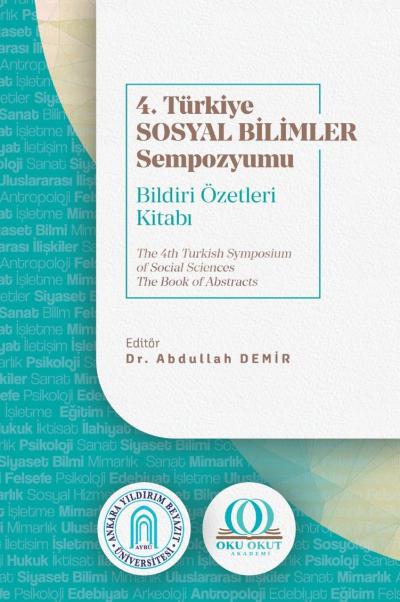Oku Okut Press reserves the right to publish and distribute the book. Permission from the publisher is required for any commercial use.
The Relation of Sufi Classics to Value Education: Analysis Riyā in Al-Ri ʿāyah li-ḥuqūq Allah
Tasavvuf Klasiklerinin Değer Eğitimi ile Münâsebeti: er-Riʿâye li-ḥuḳūḳillâh’taki Riyâ Çözümlemeleri
Authors
-
Dr. Selahattin Gölbaşıhttps://orcid.org/0000-0002-8603-4396
This study is about establishing a connection between Sufi classics and value education. Reading Sufi works with this perspective may constitute an intersection between Sufi literature and value education. The study aims to show that such a connection is possible and functional. In this study, the literature review method was used. Value education can be shown as an element that complements academic success in pre-school, primary and secondary education as well as being important in itself. The amount of efficiency to be obtained from the approaches, methods and techniques applied in value education depends primarily on the teacher. The concept of value is closely related to behavior. An effective value education improves the student's ability to distinguish right from wrong and serves as a reference for their attitudes and behaviors. Adult modeling plays a critical role in this process. A value that has not been studied in detail by the teacher is difficult to present with high performance. In order for teachers to gain an in-depth understanding of values, they should consult literary texts, sociology, anthropology, moral philosophy as well as Sufi literature. Sufism, which can be characterized as a kind of ""Muslim wisdom"", has contributed to the universe of morality and values along with language, culture, art and architecture in a geography stretching from Central Asia to the Balkans. In this article, some of the network of relationships between Sufi classics and value education is identified. The paper suggests that value educators benefit from the rich Sufi thought. The text of the paper is limited to the analysis of riya in al-Riʿāyah li-ḥuqūq Allah wa'l-ḳiyām bihā by al-Ḥarith al-Muḥāsibī (died 243/857), which is known as the first classic work of Sufism. By making connections between the chapter and value education, it is shown that Sufi classics are capable of providing qualified support for the mastery of domain knowledge needed to apply approaches to value education, especially direct teaching of values, value development, value analysis, and character education. In conclusion, by looking at the analysis of riya in al-Muḥāsibī's Al-Riʿāyah li-ḥuqūq Allah, it is possible to say that Sufi classics offer a wide range of possibilities for theoretical and practical solutions in the educational process in the planning phase of values education and when it comes to adult modeling in values education.
Bu çalışma, Tasavvuf klasikleri ile değer eğitimi arasında irtibat kurmayı konu edinmektedir. Tasavvuf eserlerini bu gözle okumak, tasavvuf literatürü ile değer eğitimi arasında bir kesişim alanı teşkil edebilir. Çalışma, anılan türden bir irtibatın mümkün ve işlevsel olduğunu göstermeyi amaçlamaktadır. Çalışmada, literatür taraması yöntemi kullanılmıştır. Değer eğitimi, bizatihi önem arz etmekle birlikte okul öncesi, ilk ve orta öğretimde akademik başarıyı bütünleyen bir unsur olarak da gösterilebilir. Değer eğitiminde uygulanan yaklaşım, yöntem ve tekniklerden elde edilecek verimin niceliği, öncelikle öğretmene bağlıdır. Değer kavramı, davranış ile yakından ilgilidir. Etkili bir değer eğitimi, öğrencinin doğruyu yanlıştan ayırma yeteneğini geliştirir, tutum ve davranışlarına referans olur. Bu süreçte yetişkin modelliği kritik bir role sahiptir. Öğretmence ayrıntılı olarak etüt edilmeyen bir değerin, yüksek performansla sunulması zordur. Öğretmenlerin değerler hakkında derinlemesine bir kavrayışa kavuşmaları için müracaat edecekleri yazılı kaynaklar arasında edebî metinlerin; sosyolojinin, antropolojinin, ahlak felsefesinin yanı sıra tasavvuf literatürünün de bulunması gerekir. Bir tür “Müslüman bilgeliği” olarak da niteleye bileceğimiz tasavvuf, Türkistan’dan Balkanlar’a uzanan bir coğrafyada dil, kültür, sanat ve mimariyle birlikte ahlak ve değer evrenine de katkılarda bulunmuştur. Bu yazıda, tasavvuf klasikleri ile değer eğitimi arasındaki ilişki ağının bir kısmı tespit edilmiştir. Çalışmada, değer eğitimcilerine, zengin tasavvuf düşüncesinden yararlanmaları önerilmektedir. Tebliğ metni, tasavvuf ilminin ilk klasik eseri olarak bilinen Hâris el-Muhâsibî’nin (v. 243/857) er-Riʿâye li-ḥuḳūḳıllâh ve’l-ḳıyâm bihâ isimli eserindeki riya çözümlemeleri ile sınırlandırılmıştır. Ele alınan bölüm ile değer eğitimi arasında ilgiler kurularak, değer eğitiminde özellikle değerlerin doğrudan öğretimi, değer geliştirmeci yaklaşım, değer analizi ve karakter eğitimi gibi yaklaşımları uygulamak için gereken alan bilgisi hâkimiyetine, tasavvuf klasiklerinin nitelikli bir destek tedarik etme kabiliyeti taşıdığı gösterilmiştir. Sonuç olarak, Hâris el-Muhâsibî’nin er-Riʿâye li-ḥuḳūḳıllâh adlı eserindeki riya çözümlemelerine bakarak, değerler eğitiminin planlama safhasında ve değer eğitiminde yetişkin modelliği söz konusu olduğunda, eğitim sürecindeki teorik ve pratik çözümler için tasavvuf klasiklerinin geniş olanaklar sunduğunu söylemek mümkündür.
Copyright
Copyright (c) 2024 Oku Okut Press
ePub License

This work is licensed under a Creative Commons Attribution-NonCommercial 4.0 International License.
Downloads
Publication Information
-
Publication TypeChapter
-
Volume
-
Pages63-66
-
Forthcoming24 August 2024
-
Series
-
Series Position6
-
Categories
Gölbaşı, Selahattin. “The Relation of Sufi Classics to Value Education: Analysis Riyā in Al-Ri ʿāyah Li-ḥuqūq Allah”. The 4th Turkish Symposium of Social Sciences: The Books of Abstracts. ed. Abdullah Demir - critical ed . 6/63-66. Social Sciences Proceedings. Ankara: Oku Okut Press, 2024. https://doi.org/10.55709/okuokutyayinlari.302












